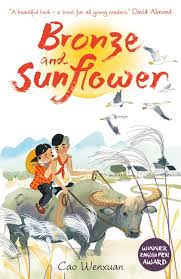Setting up a school bookclub ~ Q&A with Theresa Munford
Dr Theresa Munford, an experienced Chinese teacher, has established a successful book club at St. Gregory's School in Bath. Her pupils have responded in really insightful ways to a selection of books. We asked Theresa to tell us more.
Why did you set up a bookclub for reading translated Chinese literature in your school?
 The inspiration came from a talk at the annual IOE/Confucius Institute conference for Mandarin teachers by Frances Weightman and Helen Wang. They spoke of the huge output of writing for young people in China that our students in the UK have very little exposure to. Literature gives readers an insight into other cultures, and writing for young people gives British students richer insights than text books or texts aimed at language learners may not. Also, students who enjoy reading can encounter books that they may otherwise not have come across. Our school, like most, encourages literacy across the curriculum so the English department and the library are always supportive of new initiatives. Moreover, there is increasing emphasis in language learning for ‘authentic texts’ and although most Chinese literary texts may be too difficult to learners to read in the original language, this is an excellent way for learners to engage with a range of Chinese writing.
The inspiration came from a talk at the annual IOE/Confucius Institute conference for Mandarin teachers by Frances Weightman and Helen Wang. They spoke of the huge output of writing for young people in China that our students in the UK have very little exposure to. Literature gives readers an insight into other cultures, and writing for young people gives British students richer insights than text books or texts aimed at language learners may not. Also, students who enjoy reading can encounter books that they may otherwise not have come across. Our school, like most, encourages literacy across the curriculum so the English department and the library are always supportive of new initiatives. Moreover, there is increasing emphasis in language learning for ‘authentic texts’ and although most Chinese literary texts may be too difficult to learners to read in the original language, this is an excellent way for learners to engage with a range of Chinese writing.
How hard did you have to work to get the pupils interested?
I have found that there is a core group of students who are interested and they often encourage others by word of mouth. The librarians have been very supportive and have given us a display area and posters and I regularly post reminders about the books on the ‘memo keeper’ slides that all tutors show their tutor groups every morning. Until now, there have only been about 30 students in total studying Mandarin but I am hoping that this year there will be increased interest as we will be joining the Mandarin Excellence Programme and all Year 7s will do at least one term of Mandarin
I make sure I read the book first and try to think of tie-ins to attract the pupils’ attention. For example the last book we read Again I see the Gaillardias had such a strange title, so the librarian and I planted a pot of gaillardias flowers in the library to draw attention to the book.
 Which books do you think the pupils enjoyed most (either genre or specific titles)?
Which books do you think the pupils enjoyed most (either genre or specific titles)?
We’ve only read novels so far and they have all been very different genres. They particularly enjoyed Bronze and Sunflower and the animal story Jackal and Wolf. Interestingly, The Bear Whispers to Me, which was a very mysterious book, appealed to some of the older readers and gave them a lot to talk about in terms of who the characters were. There weren’t many takers for Again I see the Gaillardias; this may have been because of the uninspiring title and cover or simply that it was the books choice for the summer term when older students are busy with exams and there are lots of other events going on.
How many pupils were involved, and what do you think they gained from it?
It is still only a tiny minority who come to termly discussions. Maybe about 10 students regularly read the books and of these four or five may show up for the club. More may have read the books after they’ve been the featured read for that term as they are then shelved with other translated books. (I’m considering asking the librarian to integrate the books with other novels from now on, rather than have them in a ‘foreign section’) I am optimistic that the numbers reading the books will pick up next year as Mandarin becomes more widespread in the school. I intend to promote the club among the Year 7s — until now students only take up Mandarin in Year 9 and then only in small groups.
In terms of benefit, those who have taken an interest have gained lots. Two of the older students (Year 10 and Year 11) wrote reviews and filmed a discussion about the book. Others said they felt they’d learnt a lot about Chinese culture and been challenged from their reading.
 To what extent do you think this could become a pupil-led activity?
To what extent do you think this could become a pupil-led activity?
Definitely! This not only relieves teachers of more workload but is valuable experience for students. One student took on responsibility in the first 18 months of the club, mainly as the person other students should go to if they were interested. Starting from this term, however, I am planning to recruit a team of maybe two to take on more responsibility, especially in terms of choosing the books, promoting them and so on. I have chosen the book for the coming term but intend to meet with those interested and run through the options for the next reads. I am also going to encourage them to produce the posters (simple A4 ones are sufficient).
What do you think would be the minimum time commitment from the staff member?
The main time commitment is for the staff member to read the books, attend the termly meeting, make a poster or two (or facilitate the students doing so) and just oversee the club, for example collating a list of possible titles (The Writing Chinese project at Leeds University and Helen Wang the translator have been very helpful with suggestions) Also the support of the school librarian is key, if they are keen the librarian will make sure the books get displayed and students directed to them.
How many books is it realistic to attempt over the year?
So far, we have read three books a year (ie one each term) but I think that one book every half term (except perhaps the final term June-July) might work better. That would mean five books a year. This would keep the pace and interest up and also mean that by the time we meet the students who read the book earlier haven’t forgotten it too much.
Are two or three copies of the book sufficient?
We are a school of about 1,000 students and three books is just about right. The librarian puts them on one-week-loan in the term they are the featured book.
Which pupils should you target – does it matter whether or not they are learning Chinese language, year groups etc?
Until now, we targeted Years 9 and up because they are the students studying Chinese (although the book club was advertised across the school) but from now on we will target Year 7s to whet their appetite. It is important for the staff member to read the book first — some of the books have quite babyish covers and yet the content is more challenging than the cover implies. For example, The Bear Whispers to Me has a cover that some students said reminded them of children’s books like The Gruffalo yet the story is quite a harrowing one. Once you’ve read the book you’ll have a better idea of which age range may be interested (although students can often surprise you in terms of their interests and reading maturity).
How important is it to have the support of your school management team?
I think most Senior Leadership Teams would welcome any such initiative as it ticks lots of boxes about literacy, multi-culturalism and such like. The key person to have onside is the school librarian, and also the English department. It is important to stress that their workload is not going to be added to and there’s minimal cost!
I’m considering setting up a Reading Chinese bookclub in my school. What are the first steps, and are there any other factors (eg safeguarding issues) I should consider before going ahead?
Talk to the librarian, show them some examples of books and maybe choose the first one to launch it (Bronze and Sunflower was a good starter for us and it has recently won an international prize). Ask some of your more enthusiastic readers among the pupils if they are interested to help. Fix a date for the club to meet perhaps just after a half term or holiday and then make sure that posters are up in the library and any other bulletin boards/memo keepers that the school uses. Also, add a paragraph to the school newsletter. The students could maybe get a slot in a school assembly to publicize it or even do a short video clip that could be shown at an assembly. In fact, a termly video clip review of the book might be a valuable promotional tool, and students seem to really enjoy making videos.
The safeguarding issue will come up if the book club is being flagged up outside of school, so speak to your safeguarding officer to check. The normal principle is that only first names of students are used, not surnames and that parental permission is given if there is any filming or outside publishing.
And you can read some of the reviews from the Saint Gregory's bookclub on our School Bookclubs page.
